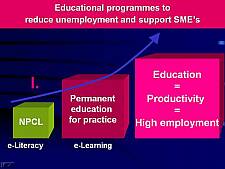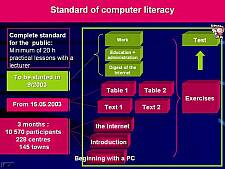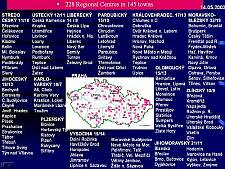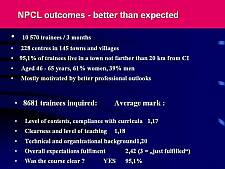- Introduction
- Activities at universities
- Government and state administration support
- Private institutions
- Conclusion and recommendation
1. Introduction
Specific conditions in the Czech RepublicA. Due to the previous communist regime, the computers have found a way into the ordinary life more slowly and thus the number of Czech senior citizens who did not come across new technologies during their active lives is enormous.
B. Most of the senior citizens cannot afford a home computer with access to the Internet. Thus they can only access the Internet on computers available to the public.
C. The government authorities and officials as well as the managements of most of the state- financed universities realise this and make every effort to improve the situation (in 2003 the Ministry of Education launched special programmes for U3V development).
- in courses run by state universities,
- in special courses organised by the Ministry of Informatics or
- at some private institutions.
2. Activities at universities
Motivation:There is a growing awareness at the Czech universities that, next to the traditional tasks (educating the nation's elite professionals and promoting science), the universities have to address new issues concerning society as a whole.
Care for the senior citizen's quality of life is among these issues.
Out of the total of 23 (to our knowledge) at least at 9 public universities the senior citizens can learn about with information technologies (IT) and, even after the courses, use the university computers to access the Internet. These are mostly used to send e-mail messages to relatives and friends all over the world, learn about time-tables, programmes of theatres, browse through the newspapers etc.
The total number of senior citizens attending the IT U3V courses is about 2000 to 2500.
3. Government and state administration support
Motivation:The Czech government wants to extend the use of IT over the entire public administration (registration, taxes, legal information etc.). To this end, the Ministry of Informatics has launched a number of initiatives to help all the citizens (including the senior ones) take advantage of all the new opportunities offered by information technologies.
Part of a programme designed by ing. Pavel Komárek
and implemented by the Ministry of Informatics.
National Programme of Computer Literacy
Ing. Pavel Komárek
Programme Author
pavel.komarek@centruminternetu.cz
June 2003
4. Private institutions
Motivation:There is a number of (both private and semi-state) institutions which, for humanitarian and other reasons, provide the senior citizens with courses on and use of IT. Among them are pensioners' homes, unincorporated associations committed to uphold the senior citizens' standard of life, etc. It is typical of this type that courses on and use of IT only make up a fraction of the activities (with the bulk focussed on gerontological issues, memory exercises etc.) In some places even Internet Cafes are available run on a purely commercial basis.
5. Conclusion and recommendation
1. We believe that universities will go on offering to senior citizens a wide spectrum of high-level IT courses at moderate prices. However, small towns and villages will still stay outside the range of universities and government-supported opportunities.
2. The demand for IT courses will die out after some 15 to 20 years (since the present forty-year-olds will all be in the know). The question remains what information and services will be attractive then for senior citizens and what can IT (the Internet) offer to improve the quality of their lives.






